De Nederlandse schrijver en vertaler Albert Alberts werd op 23 augustus 1911 in Haarlem geboren. Zie ook mijn blog van 23 augustus 2006.
Uit: De bomen
“Hij sloeg het portier achter zich dicht. Hij liep van de weg af het bos in. Hij moest even zoeken, voor hij het pad gevonden had. Toen liep hij vlugger door. Hij zag in het donker de stammen van de bomen, die langs het pad stonden. Hij liep maar door. Het werd lichter en hij liep maar door en toen het steeds lichter werd, zag hij, dat de bomen met hem mee liepen. ( … ) hij zag, dat het bos in de verte ophield. Hij zag het omgeploegde roggeveld van Albert. Ineens bleef hij stilstaan. De bomen stonden om hem heen. Aart zei: Zo is het. Hij riep: Zo is het! Hij schreeuwde: Zo is het! Jullie allemaal! Zo is het! de bomen bewogen zachtjes.
Zo is het, hè? vroeg Aart.”
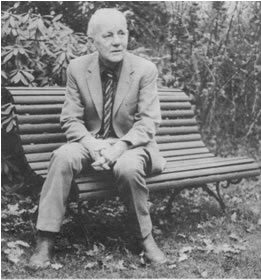
Albert Alberts (23 augustus 1911 – 16 december 1995)
De Engelse dichter en schrijver William Ernest Henley werd geboren op 23 augustus 1849 in Gloucester. Als kind kreeg hij tbc en moest er een van zijn voeten geamputeerd worden. Wegens zijn verblijf in het sanatorium dat twintig maanden duurde begon hij gedichten te schrijven. In 1874 leerde hij Robert Louis Stevenson. Zij raakten bevriend en samen schreven ze vier theaterstukken die tegenwoordig bijna vergeten zijn. Ook publiceerde Henley verschillende dichtbundels: A Book of Verses (1888), The Song of the Sword (1892), London Voluntaries (1893), Collected Poems (1898), Hawthorn and Lavender (1901) en In Hospital (1903). Zijn gedicht Pro rege nostro was met name tijdens WO I zeer geliefd.
Pro rege nostro
WHAT have I done for you,
England, my England?
What is there I would not do,
England, my own?
With your glorious eyes austere,
As the Lord were walking near,
Whispering terrible things and dear
As the Song on your bugles blown,
England–
Round the world on your bugles blown!
Where shall the watchful sun,
England, my England,
Match the master-work you’ve done,
England, my own?
When shall he rejoice agen
Such a breed of mighty men
As come forward, one to ten,
To the Song on your bugles blown,
England–
Down the years on your bugles blown?
Ever the faith endures,
England, my England:–
‘Take and break us: we are yours,
England, my own!
Life is good, and joy runs high
Between English earth and sky:
Death is death; but we shall die
To the Song on your bugles blown,
England–
To the stars on your bugles blown!’
They call you proud and hard,
England, my England:
You with worlds to watch and ward,
England, my own!
You whose mail’d hand keeps the keys
Of such teeming destinies,
You could know nor dread nor ease
Were the Song on your bugles blown,
England,
Round the Pit on your bugles blown!
Mother of Ships whose might,
England, my England,
Is the fierce old Sea’s delight,
England, my own,
Chosen daughter of the Lord,
Spouse-in-Chief of the ancient Sword,
There ’s the menace of the Word
In the Song on your bugles blown,
England–
Out of heaven on your bugles blown!
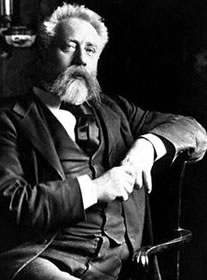
William Henley (23 augustus 1849 – 11 juli 1903)
De Duitse dichter Theobald Hock werd geboren op 23 augustus 1573 in Limbach/Pfalz-Zweibrücken. Hij heeft slechts een enkel literair werk nagelaten, de in 1601 gedrukte gedichtenverzameling Schönes Blumenfeld. De literatuurwetnschap plaatste hem doorgaans tussen humanisme en barok. Belangrijker is echter dat hij temidden van al het neolatijn dat in zijn tijd geschreven werd de poging ondernam om gedichten in het Duits te schrijven.
Von Art der Deutschen Poeterey (fragment)
Die Deutschen haben ein b’sonder Art und Weise
Dass sie der fremden Völker Sprach mit Fleisse
Lernen und wöllen erfahrn
Kein Müh nicht spar’n
In ihren Jahren.
Wie solches den ist an ihm selbs’ hoch z’loben
Drauss man ihr Geschicklichkeit gar wol kan proben
Wenn sie nur auch ihr eigene Sprachen
Nit unwerth machen
Durch solche Sachen.
Den ander Nationen also b’scheide
Ihr Sprach vor ändern loben und preisen weidte
Manch Reimen drin dichten
So künstlich schlichten
Und z’sammen richten.
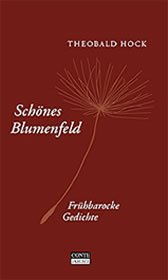
Theobald Hock (23 augustus 1573 – † na 1624)
Boekomslag (Geen portret beschikbaar)
De Amerikaanse dichter Edgar Lee Masters werd geboren op 23 augustus 1868 in Garnett, Kansas. Hij werd advocaat, waarbij hij vaak als verdediger van de armen optrad. Vanaf 1914 kreeg hij steeds meer bekendheid als dichter, toen hij onder het pseudoniem Webster Ford begon te publiceren. Zijn gedichten verschenen aanvankelijk in Reedy’s Mirror en werden in 1915 verzameld in Spoon River Anthology. Hierin brengen de doden vanop ‘het kerkhof op de heuvel’ details uit hun leven naar voor. De fictieve stad Spoon River werd genaamd naar de rivier die dichtbij zijn huis stroomde. Deze vernieuwende aanpak werd gekleurd door Masters’ herinneringen uit zijn kinderjaren aan voormalige inwoners van Lewistown en Petersburg, Illinois.
Nicholas Bindle
Were you not ashamed, fellow citizens,
When my estate was probated and everyone knew
How small a fortune I left?–
You who hounded me in life,
To give, give, give to the churches, to the poor,
To the village!–me who had already given much.
And think you not I did not know
That the pipe-organ, which I gave to the church,
Played its christening songs when Deacon Rhodes,
Who broke and all but ruined me,
Worshipped for the first time after his acquittal?
Alfonso Churchill
They laughed at me as “Prof. Moon,”
As a boy in Spoon River, born with the thirst
Of knowing about the stars.
They jeered when I spoke of the lunar mountains,
And the thrilling heat and cold,
And the ebon valleys by silver peaks,
And Spica quadrillions of miles away,
And the littleness of man.
But now that my grave is honored, friends,
Let it not be because I taught
The lore of the stars in Knox College,
But rather for this: that through the stars
I preached the greatness of man,
Who is none the less a part of the scheme of things
For the distance of Spica or the Spiral Nebulae;
Nor any the less a part of the question
Of what the drama means.

Edgar Lee Masters (23 augustus 1868 – 5 maart 1950)
De Hongaars/Israëlische schrijver Ephraïm Kishon werd op 23 augustus 1924 in Boedapest geboren als Farenc Hoffman. Zie ook mijn blog van 23 augustus 2006.
Uit: Tragisches Ende eines Feullitonisten
“Wart’s ab. Insgesamt schickte ich Kunstetter etwa zwanzig Lobeshymnen. Ich philosophierte in seine banale Zeilenschinderei alle möglichen Tiefsinnigkeiten hinein, ich pries seine albernen Kalauer als stilistische Finessen, ich zitierte wörtlich seine Formulierungen, mit Vorliebe die dümmsten. Als ich ganz sicher war, daß meine täglichen Begeisterungsausbrüche zu einem festen, unentbehrlichen Bestandteil seines Lebens geworden waren, bekam er den ersten, leise enttäuschten Brief: “Sie wissen, wie sehr ich die Meisterwerke Ihrer Feder bewundere”, schrieb ich. “Aber gerade das Ausmaß meiner Bewunderung berechtigt – nein, verpflichtet mich, Ihnen zu sagen, daß Ihre letzten Artikel nicht ganz auf dem gewohnten Niveau waren. Ich bitte Sie inständig: nehmen Sie sich zusammen!”
Eine Woche später kam der nächste, schon etwas deutlichere Aufschrei: “Um Himmels willen, was ist geschehen? Sind Sie ein andrer geworden? Sind Sie krank und lassen Sie einen Ersatzmann unter Ihrem Namen schreiben? Was ist los mit Ihnen?!”
Kunstetters Feuilletons wurden um diese Zeit immer länger, immer blumiger, immer ausgefeilter. Er machte übermenschliche Anstrengungen, um sich wieder in meine Gunst zu schreiben. Vergebens. Gestern bekam er den Abschiedsbrief: “Kunstetter! Es tut mir leid, aber nach Ihrem heutigen Artikel ist es aus zwischen uns. Auch der beste Wille des verehrungsvollsten Lesers hat seine Grenzen. Mit gleicher Post bestelle ich mein Abonnement ab. Leben Sie wohl…” Und das war das Ende.?
Jossele zündete sich eine Zigarette an, wobei ein diabolisches Grinsen ganz kurz über sein Gesicht huschte. Mich schauderte. Kleine, kalte Schweißperlen traten mir auf die Stirn. Ich muß gestehen, daß ich mich vor Jossele zu fürchten begann. Und ich frage mich, warum ich ihn eigentlich erfunden habe.“
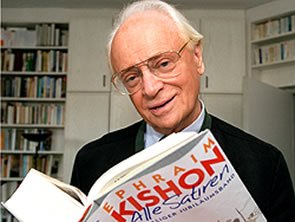
Ephraïm Kishon (23 augustus 1924 – 29 januari 2005)
De Roemeense essayist, filosoof, kunsthistoricus en politicus Andrei Gabriel Pleşu werd geboren op 23 augustus 1948 in Boekarest. Na zijn promotie werd hij eerst docent aan de Academie voor Schone Kunsten in Boekarest. In 1982 moest hij Roemenië om politieke redenen verlaten. Na zijn terugkeer in 1989 werd hij verbannen naar het dorp Tescani vanwege zijn contacten met de dichter Mircea Dinescu. Na de revolutie was hij tot 1991 minister van cultuur. Daarna werd hij hoogleraar godsdienstfilosofie. Van 1997 tot 1999 was hij de partijloze minister van Buitenlandse Zaken, waarbij hij toenadering tot het westen zocht. Voor zijn literaire en politieke activiteiten ontving Pleşu tal van onderscheidingen.
Uit: Deutsche, bekennt Euch zu Eurer Sprache!
“Der Anspruch auf eine gute Verwendung der Sprache richtet sich vor allem an die Menschen und Institutionen, für die das Sprechen ein Beruf ist: an die Presse in allen ihren Varianten, die Schule auf all ihren Ebenen, an die Schriftsteller und Politiker. Aus dieser Ecke werden gültige und taugliche Kriterien für einen Lebensstil und ein menschenwürdiges Zusammenleben erwartet. Der Parlamentarier, der eine Rede hält, übermittelt nicht nur eine politische Botschaft, konterkariert nicht nur die Meinung eines Gegners – er bietet seiner Zuhörerschaft eine “manière d’être” an, ein gewisses Verhaltens-Design, ein globales Gefühl der öffentlichen Ordnung und Werte.
“Was würdest du als erstes tun, wenn man dich mit den Regierungsgeschäften beauftragen würde?”, wurde einmal Konfuzius gefragt. Die Antwort lautete folgendermaßen: “Das Wesentliche ist, die Dinge korrekt zu benennen. Wenn die Bezeichnungen nicht korrekt sind, passen die Wörter nicht mehr. Wenn die Wörter nicht mehr passen, gehen die Staatsgeschäfte schlecht. Wenn die Staatsgeschäfte schlecht gehen, können auch Rituale und Musik nicht gedeihen. Wenn Rituale und Musik nicht gedeihen können, sind Urteile und Strafen nicht länger gerecht. Wenn Urteile nicht mehr gerecht sind, weiß das Volk nicht mehr, wie es sich verhalten soll.”…
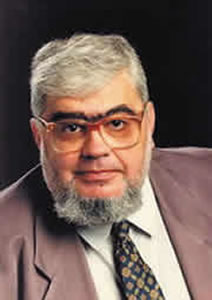
Andrei Pleşu (Boekarest, 23 augustus 1948)


